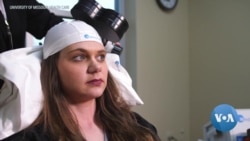Depression is more than just feeling sad. It is a serious disease. Depression can interfere with normal life and a person’s sense of self-worth. It can end in suicide.
Some people are helped with traditional treatments, such as medicine or talking with mental health experts. Yet these treatments are not 100 percent effective. Luckily, there are other methods people can try.
One such treatment involves bursts of electromagnetic energy. It sends magnetic pulses directly to the brain.
Sonya Kibbee is from Columbia, Missouri. She works as a physical therapist. Kibbee says she is normally active, but because of severe depression last year, she had trouble making simple decisions.
“Just dumb little decisions that we make that we don’t even think about, I have to think about. And then it just gets me more stressed out because every little decision is hard.”
People suffering from depression often seem to lack energy or interest in the things around them. Depression affects how much a person eats and can interfere with sleep.
Even with medication and talking with mental health professionals, Kibbee said, she thought about suicide. Doctors ordered hospital stays for her several times.
Then she heard about TMS, short for Transcranial Magnetic Stimulation. TMS does not involve doctors operating on the patient. And the treatment usually does not require anesthesia.
TMS uses a wire to send powerful magnetic pulses to the brain. During the treatment, patients feel gentle, repeated beats on their head. The treatment can cause minor pain inside the head. So before her treatments, Kibbee took pain medicine, which reduced the sensation. After one week, she said she noticed a real difference.
“I just felt so much better.”
After more than 30 treatments, her signs of depression almost disappeared.
Doctor Muaid Ithman directs the TMS program at University of Missouri Health Care. He says the treatment can help patients when other methods do not.
“Basically, 50 (or) 60 percent of people who suffer from treatment resistant depression will see a clinically meaningful response to TMS. And one third of these people will go into remission, which means that their symptoms will completely will go away.”
The United States National Institute of Mental Health has reported on two large studies on the safety of TMS. It said they found that most side effects, such as head pain, were minor to moderate. However, the treatment is relatively new. The institute added that long-term side effects are unknown, and more studies are needed.
As for Kibbee, she returned to work and some of her favorite activities.
I'm Caty Weaver.
Carol Pearson reported this story for VOANews.com. George Grow adapted it for Learning English. Caty Weaver was the editor.
__________________________________________________________
Words in This Story
pulse – n. a beating noise; the beat resulting from such a sound
stressed – adj. feeling very worried
clinically – adv. relating to or based on work done with real patients; of or relating to the medical treatment that is given to patients in hospitals or medical centers
anesthesia – n. a loss of sensation; something that produces a loss of sensation
response – n. something that is done or happens as a reaction to something else
symptom – n. a change in the body or mind which indicates that a disease is present
We want to hear from you. Write to us in the Comments Section.





